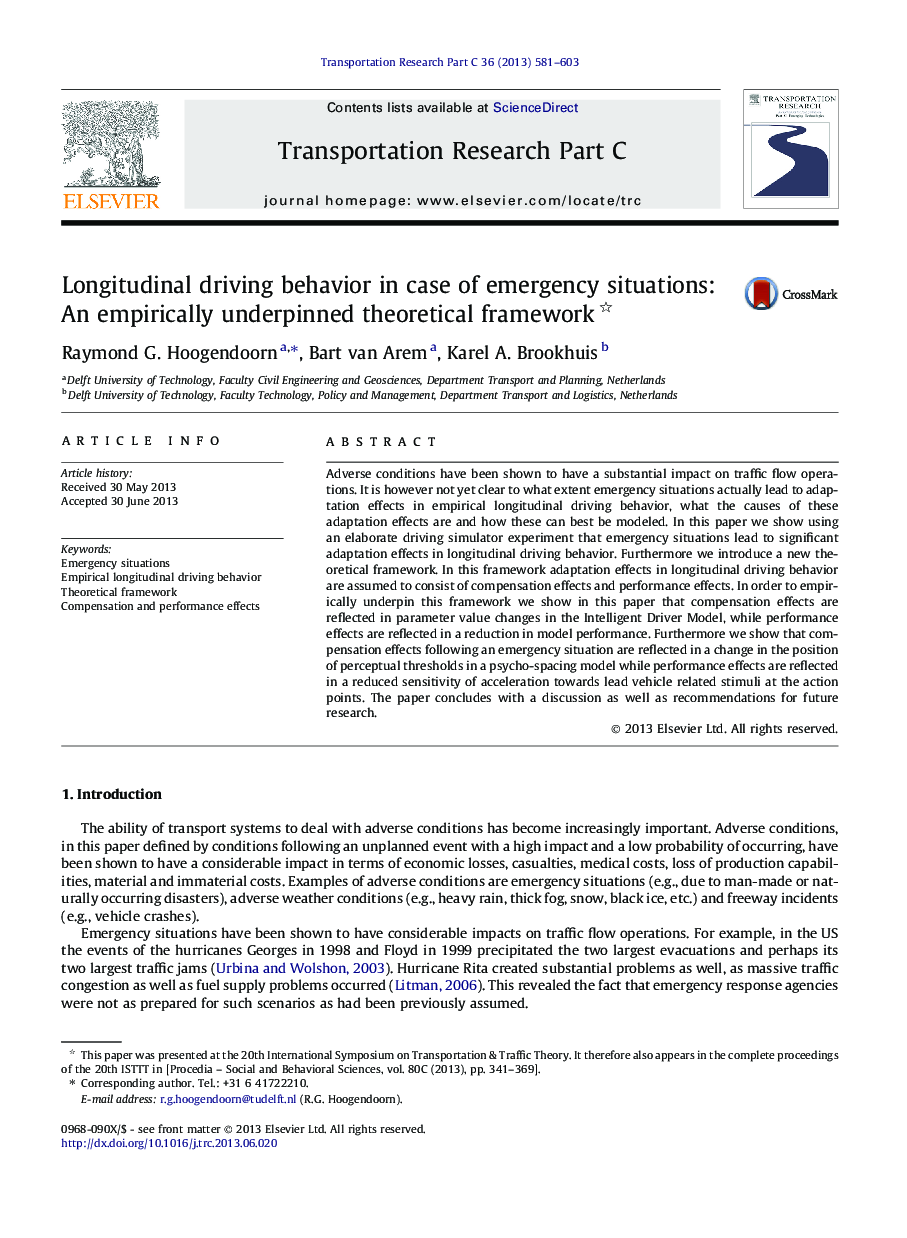| کد مقاله | کد نشریه | سال انتشار | مقاله انگلیسی | نسخه تمام متن |
|---|---|---|---|---|
| 6937334 | 869116 | 2013 | 23 صفحه PDF | دانلود رایگان |
عنوان انگلیسی مقاله ISI
Longitudinal driving behavior in case of emergency situations: An empirically underpinned theoretical framework
ترجمه فارسی عنوان
رفتار رانندگی طولی در شرایط اضطراری: یک چارچوب نظری تجربی استوار است
دانلود مقاله + سفارش ترجمه
دانلود مقاله ISI انگلیسی
رایگان برای ایرانیان
کلمات کلیدی
شرایط اضطراری، تجربی رفتار رانندگی طولی، چارچوب نظری، جبران خسارت و اثرات عملکرد،
ترجمه چکیده
مشخص شده است که شرایط معکوس تأثیر قابل توجهی بر عملیات جریان ترافیک داشته است. با این وجود هنوز مشخص نیست که در چه شرایطی شرایط اضطراری به طور واقعی منجر به اثرات سازگاری در رفتار رانندگی طولی تجربی می شود، علت این اثرات سازگاری و چگونگی مدل سازی بهترین آنها. در این مقاله ما با استفاده از یک آزمایش شبیه ساز رانندگی دقیق نشان می دهیم که شرایط اضطراری منجر به اثرات سازگاری قابل توجه در رفتار رانندگی طولی می شود. علاوه بر این، ما یک چارچوب نظری جدید را معرفی می کنیم. در این چارچوب، اثرات سازگاری در رفتار رانندگی طولی فرض می شود که شامل اثرات جبران و اثرات عملکرد است. به منظور تجربی این چارچوب، در این مقاله نشان داده شده است که اثرات جبران در تغییرات ارزش پارامتر در مدل راننده هوشمند، در حالی که اثرات عملکرد در کاهش عملکرد مدل منعکس شده است، نشان داده شده است. علاوه بر این ما نشان می دهیم که اثرات غرامت پس از وضعیت اضطراری در تغییر در موقعیت آستانه ادراک در مدل روانی فاصله قرار می گیرند، در حالی که اثرات عملکرد در کاهش حساسیت شتاب نسبت به محرک های مرتبط با خودرو در نقاط عمل بازتاب می یابد. این مقاله با بحث و همچنین توصیه هایی برای تحقیقات آینده به پایان می رسد.
موضوعات مرتبط
مهندسی و علوم پایه
مهندسی کامپیوتر
نرم افزارهای علوم کامپیوتر
چکیده انگلیسی
Adverse conditions have been shown to have a substantial impact on traffic flow operations. It is however not yet clear to what extent emergency situations actually lead to adaptation effects in empirical longitudinal driving behavior, what the causes of these adaptation effects are and how these can best be modeled. In this paper we show using an elaborate driving simulator experiment that emergency situations lead to significant adaptation effects in longitudinal driving behavior. Furthermore we introduce a new theoretical framework. In this framework adaptation effects in longitudinal driving behavior are assumed to consist of compensation effects and performance effects. In order to empirically underpin this framework we show in this paper that compensation effects are reflected in parameter value changes in the Intelligent Driver Model, while performance effects are reflected in a reduction in model performance. Furthermore we show that compensation effects following an emergency situation are reflected in a change in the position of perceptual thresholds in a psycho-spacing model while performance effects are reflected in a reduced sensitivity of acceleration towards lead vehicle related stimuli at the action points. The paper concludes with a discussion as well as recommendations for future research.
ناشر
Database: Elsevier - ScienceDirect (ساینس دایرکت)
Journal: Transportation Research Part C: Emerging Technologies - Volume 36, November 2013, Pages 581-603
Journal: Transportation Research Part C: Emerging Technologies - Volume 36, November 2013, Pages 581-603
نویسندگان
Raymond G. Hoogendoorn, Bart van Arem, Karel A. Brookhuis,
